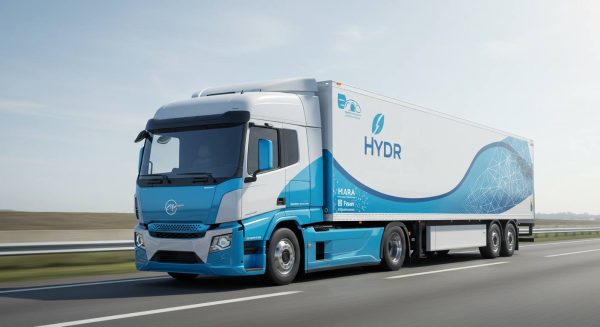The growing adoption of electric vehicles (EVs) and hydrogen-powered vehicles on UK roads presents unique challenges for vehicle recovery operators, particularly when dealing with disabled commercial EVs and technical issues specific to hydrogen fuel systems.
Challenges with EV Cargo Recovery
The recovery of electric commercial vehicles poses particular difficulties due to their increased weight. A typical electric van or truck can be significantly heavier than its diesel counterpart due to battery weight, often requiring specialised heavy recovery vehicles; the weight is not able to be jettisoned, unlike with a diesel-powered vehicle where freight could be removed if required. A loaded electric or hydrogen HGV requires careful consideration of both the combined weight and the high-voltage systems during recovery operations.

Hydrogen Vehicle Recovery Challenges
Hydrogen vehicles present several distinct problems during recovery operations:
- High-pressure fuel systems operating at up to 700 bar require specific safety protocols.
- Risk of invisible hydrogen leaks that could create fire hazards.
- Complex fuel cell systems that can be damaged by incorrect recovery methods.
- Limited number of qualified technicians familiar with hydrogen vehicle technology.
- Scarcity of suitable repair facilities equipped to handle hydrogen vehicles.
Safe Recovery Procedures
Recovery operators must adapt their procedures for both vehicle types. EVs cannot simply be towed with wheels on the ground, as this risks damaging the electric motors and generating dangerous voltages. The high-voltage systems, which can exceed 800V in commercial EVs, require careful handling with insulated tools and appropriate personal protective equipment.
For hydrogen vehicles, operators need specialised training to safely identify and isolate potential hydrogen leaks. This includes using specific gas detection equipment and understanding emergency shutdown procedures.
Equipment Requirements
Traditional recovery vehicles are being upgraded to handle new alternative fuel vehicles. Key requirements include:
- Enhanced lifting capacity for heavier electric vehicles
- Electrical isolation equipment for safe EV handling
- Gas detection systems for hydrogen vehicle recovery
- Specialised personal protective equipment
- Insulated recovery tools rated for high voltage
Training and Certification
The DVSA requires recovery operators to have specific competencies for handling alternative fuel vehicles. This includes understanding both high-voltage systems and hydrogen fuel cell technology. The limited infrastructure for hydrogen vehicle repair means recovery operators often need to transport vehicles longer distances to reach suitable facilities.
Looking Ahead
As the UK progresses toward its 2030 ban on new petrol and diesel car sales, recovery operators face increasing pressure to handle a growing fleet of alternative fuel vehicles. The industry must continue investing in equipment and training to safely manage both EV cargo and hydrogen vehicle recovery operations.
For fleet operators and private owners, it’s crucial to verify that their recovery provider has the necessary capabilities for these vehicles. This includes checking for specific certifications and equipment suitable for alternative fuel vehicle recovery.
Recovery operators should always consult current manufacturer guidelines and industry standards for detailed technical procedures.
